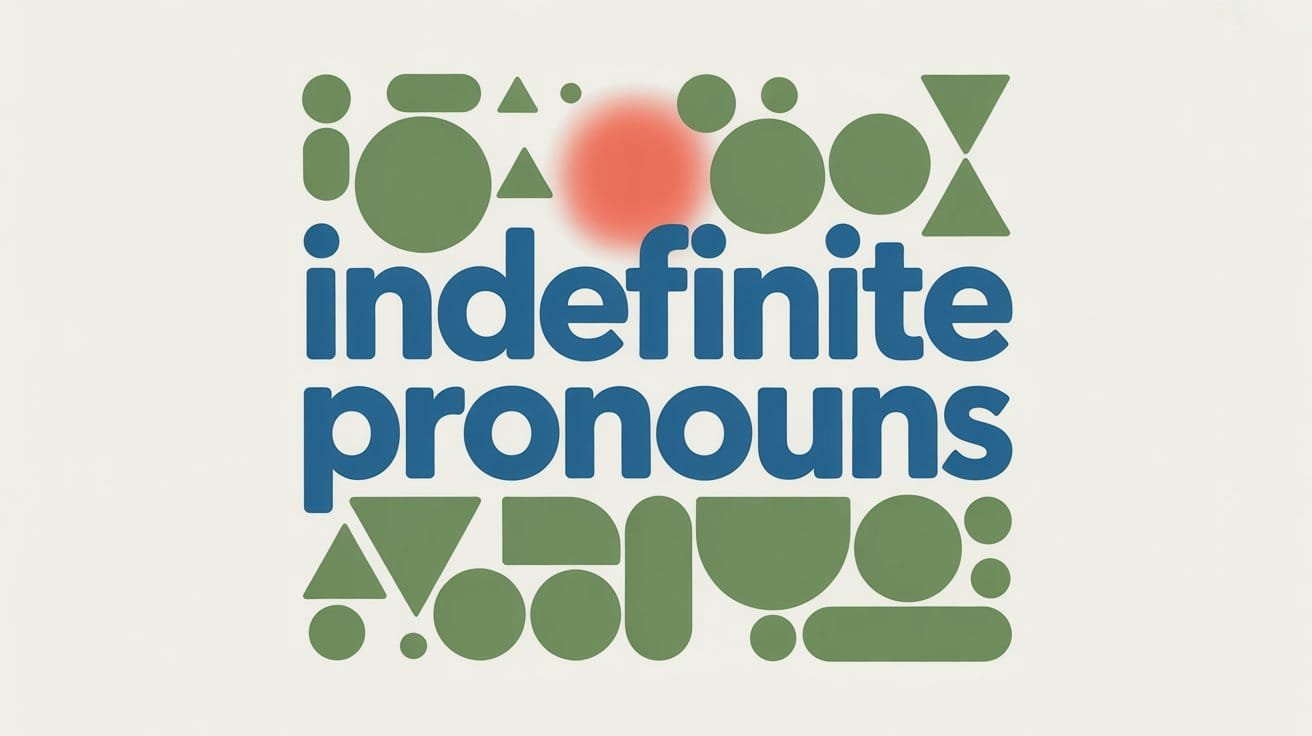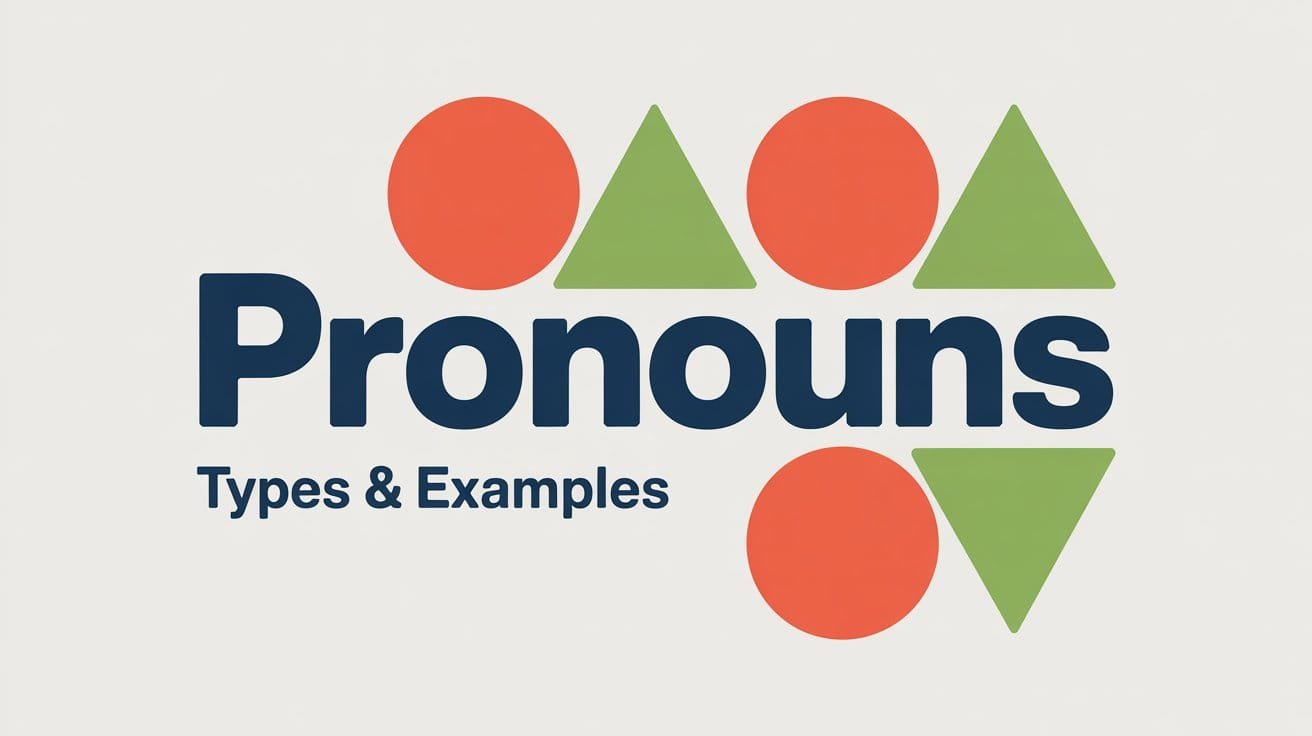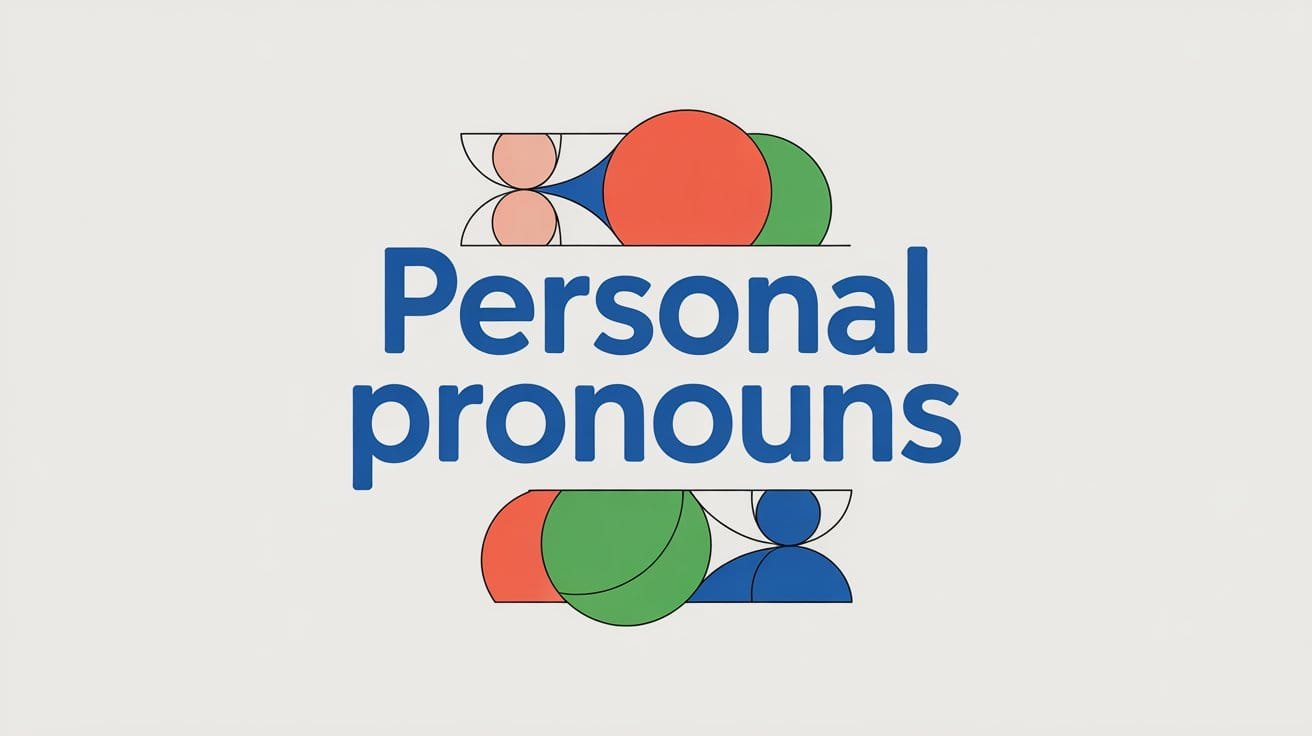Indefinite pronouns refer to people or things without naming anyone or anything specific. Words like someone, anything, everyone, and few help you talk about ideas in a general way when exact details are unknown, unimportant, or unnecessary. These pronouns allow sentences to stay clear without becoming too precise.
Indefinite pronouns help you choose the right word for the situation and avoid agreement errors in sentences. Since some indefinite pronouns are singular, some plural, and others flexible, knowing how they work improves both accuracy and confidence in everyday English.
What Are Indefinite Pronouns?
Indefinite pronouns in English grammar are the pronouns that do not point to specific people, places, or things. Instead, they refer to non-specific groups or quantities. For example, consider the sentence: “Someone left their umbrella in the hallway.” Here, “someone” is an indefinite pronoun that refers to an unknown person.
Indefinite Pronoun Definition
Indefinite pronouns are a category of pronouns used in the English language to refer to non-specific people, things, or quantities. Unlike definite pronouns, which specifically point to particular individuals or objects, indefinite pronouns provide a general or unspecific reference. They play a crucial role in enhancing language flexibility, avoiding repetitive phrasing, and maintaining a sense of mystery or inclusivity in communication. Examples of indefinite pronouns include words like “someone,” “anything,” “everyone,” “nothing,” and “many,” among others.
Types of Indefinite Pronouns: Exploring Varieties
Indefinite pronouns come in various types, each serving a specific purpose in English grammar and language. Let’s take a closer look at these categories and their examples:
1. Singular Indefinite Pronouns:
These pronouns refer to a single person or thing. They are used when you’re talking about each individual as a separate entity.
- Each: This pronoun emphasizes the individuality of each item or person.
- Each student in this class must complete their own assignment.
- Every: Use “every” to discuss things that apply to all members of a group.
- Every house on the street has its own unique charm.
2. Plural Indefinite Pronouns:
Plural indefinite pronouns are used when you’re referring to more than one person or thing without specifying exact numbers.
- Several: This indicates an unspecified number that is greater than a few.
- Several people attended the seminar.
- Many: Similar to “several,” “many” signifies a larger, unspecified quantity.
- Many books are available at the new library.
3. Singular/Plural Indefinite Pronouns:
These pronouns can be singular or plural, depending on the context.
- Some: It refers to an unspecified quantity, either singular or plural.
- Some of the cake has been eaten. (Singular)
- Some students are preparing for the exam. (Plural)
- All: Like “some,” “all” can be used for both singular and plural contexts.
- All of the water is gone. (Singular)
- All the students are excited about the field trip. (Plural)
- Any: “Any” is used when you’re not specifying a particular quantity.
- Did you bring any snacks for the movie night?
- None: It represents the absence of something.
- None of the information was accurate.
Understanding these types of indefinite pronouns allows you to express ideas with precision while maintaining a sense of flexibility. Whether you’re talking about individuality, groups, or general quantities, the diverse range of indefinite pronouns empowers you to communicate effectively and elegantly.
Indefinite Pronouns Examples in Sentences
Indefinite pronouns may seem like a linguistic puzzle, but they’re actually quite simple once you see them in action. Let’s explore some real-life sentences to better understand how these pronouns work:
- I saw someone waiting outside the store.
- In this sentence, “someone” refers to an unidentified person. We don’t know who exactly it is, but that’s okay because “someone” is doing the job of the indefinite pronoun here.
- Everyone loves a good mystery novel.
- “Everyone” covers a broad group of people, encompassing each individual’s preference for mystery novels. It’s a generalization that doesn’t point to any specific person.
- There’s nothing better than a warm cup of tea on a chilly day.
- “Nothing” emphasizes the absence of a better option than a warm cup of tea. It’s a general concept, not tied to a particular thing.
- Somebody left their umbrella in the hallway.
- “Somebody” is a way of saying an unspecified person. We don’t need to know who it was; the focus is on the action and the umbrella.
- Anybody can join the club.
- “Anybody” indicates that there’s no restriction on who can join the club. It’s an open invitation without specifying individuals.
- Many students are participating in the competition.
- “Many” highlights the quantity of students, without pointing to a specific number.
These examples showcase how indefinite pronouns smoothly replace nouns and add flexibility to your sentences. Whether you’re chatting with friends or writing a formal essay, indefinite pronouns make expressing yourself clear and straightforward.
Subject-Verb Agreement with Indefinite Pronouns
Imagine a dance where all the dancers move in perfect sync. Similarly, in sentences, the subject and the verb need to match in number for harmony. When it comes to indefinite pronouns, ensuring subject-verb agreement is crucial.
Let’s break down how subject-verb agreement works with indefinite pronouns:
- Singular Indefinite Pronouns:
- Indefinite pronouns like “each,” “every,” “someone,” and “nobody” are singular. This means they require singular verbs.
- Example: Each student has completed their assignment.
- Plural Indefinite Pronouns:
- Indefinite pronouns such as “several,” “many,” and “few” are plural. They need plural verbs.
- Example: Many people are attending the conference.
- Singular/Plural Indefinite Pronouns:
- For indefinite pronouns like “some,” “all,” “any,” and “none,” the verb’s number depends on the object of the preposition that follows the pronoun.
- If the object is singular, use a singular verb; if it’s plural, use a plural verb.
- Example 1: Some of the cake has been eaten. (Cake is singular.)
- Example 2: Some of the students are preparing for the exam. (Students is plural.)
Remember, maintaining this agreement between subject and verb ensures that your sentences are grammatically correct and easy to understand.
Why Does Subject-Verb Agreement Matter?
Subject-verb agreement isn’t just about rules; it’s about clarity. When your subject and verb don’t match in number, it can lead to confusion and misunderstanding. Consider this sentence:
- Every student have a textbook.
The mismatch between the singular subject “Every student” and the plural verb “have” creates confusion. The correct form should be:
- Every student has a textbook.
By adhering to subject-verb agreement rules, you enhance the clarity and readability of your writing, making it easier for your audience to grasp your intended message.
Common Mistakes to Avoid with Indefinite Pronouns
Navigating the world of indefinite pronouns might feel like embarking on a language adventure. However, even the most fearless explorers can stumble upon common pitfalls. Let’s shed light on these mistakes so you can confidently avoid them:
- Mismatching Verb and Indefinite Pronouns:
- Indefinite pronouns are usually singular, so the verb should also be singular.
- Incorrect: None of them have arrived yet.
- Correct: None of them has arrived yet.
- Confusing “Some” and “Any”:
- “Some”: Use it when you’re referring to a certain amount or number.
- I have some time to spare.
- “Any”: Use it when you’re referring to an indefinite amount without specifying.
- Do you have any questions?
- “Some”: Use it when you’re referring to a certain amount or number.
- Misusing “None” and “Not Any”:
- “None”: This means “not any,” so it’s already a negation.
- There is none left.
- “Not any”: Using “not any” together creates a double negative.
- There is not any left. (Avoid this)
- “None”: This means “not any,” so it’s already a negation.
- Overusing “Nobody” and “Anybody”:
- “Nobody”: It’s used when referring to no person.
- Nobody knows the answer.
- “Anybody”: It’s used when referring to any person.
- Anybody can join the workshop.
- “Nobody”: It’s used when referring to no person.
- Incorrectly Using “Neither” and “Either”:
- “Neither”: Use it when referring to two things or people, indicating “not one nor the other.”
- Neither option is suitable.
- “Either”: Use it when referring to two things or people, indicating “one or the other.”
- You can choose either color.
- “Neither”: Use it when referring to two things or people, indicating “not one nor the other.”
Indefinite Pronouns vs. Definite Pronouns
Indefinite pronouns step onto the stage when you want to talk about people, things, or concepts in a general or non-specific manner.
- Indefinite: Someone left a note on the desk.
- Indefinite: Many have tried, but few have succeeded.
- Indefinite: Nothing can stop us from achieving our dreams.
Definite pronouns, on the other hand, step up when you want to be clear and specific about who or what you’re referring to.
- Definite: The teacher left a note on the desk.
- Definite: Those are the books I’ve been searching for.
- Definite: This is the moment we’ve all been waiting for.
Using Indefinite Pronouns in Conversations and Writing: Adding Flair and Depth
Imagine a canvas awaiting your creative touch. Indefinite pronouns are the brushstrokes that infuse your conversations and writing with color and depth. They play a pivotal role in making your English language engaging, versatile, and relatable. Here’s how you can use the magic of indefinite pronouns in both spoken and written communication:
1. Conversations: Adding Casual Charm
In everyday conversations, indefinite pronouns help you strike a casual, friendly tone while maintaining clarity. They allow you to express ideas without delving into specifics, making interactions feel natural:
- Let’s meet up sometime!
- Sure thing, I’d love to!
By using indefinite pronouns like “sometime” and “thing,” you create an open-ended, relaxed atmosphere that’s perfect for casual conversations.
2. Writing: Enriching Narratives and Descriptions
In writing, indefinite pronouns serve as your creative palette, adding depth and variety to your narratives and descriptions:
- Original: Many students participated in the science fair.
- Enhanced: Many eager students, from all walks of life, participated in the captivating science fair event.
By expanding on the use of “many” and providing context, you create a vivid image in the reader’s mind, immersing them into your story.
3. Using Indefinite Pronouns for Impact:
- Everyone dreams of achieving greatness.
- This sentence draws readers into a universal truth, inviting them to connect with the sentiment.
- Nobody believed she could succeed.
- This creates intrigue and sets the stage for a story of triumph against the odds.
- Something amazing happened on that fateful day.
- “Something” sparks curiosity, urging readers to continue reading to discover what unfolded.
4. Balancing Clarity and Mystery:
In both conversations and writing, indefinite pronouns strike a balance between clarity and mystery. They provide enough information to communicate your message effectively while leaving room for imagination:
- Several people attended the event, each bringing their unique perspectives.
- While conveying the event’s attendance, you hint at the diversity of experiences without diving into specifics.
- Anybody can achieve their dreams with determination.
- By using “anybody,” you inspire a sense of possibility and encourage readers to picture themselves succeeding.
List of Indefinite Pronouns
Here’s a list of common indefinite pronouns with example sentences:
Singular Indefinite Pronouns:
- Anyone: Anyone can join the club.
- Someone: Someone left their keys on the table.
- No one: No one knows the answer.
- Everybody: Everybody is excited about the party.
- Somebody: Somebody called for you.
- Nobody: Nobody likes to be ignored.
- Anything: I’ll eat anything you cook.
- Something: There’s something special about that place.
- Nothing: Nothing is impossible if you believe.
- Everyone: Everyone is welcome to participate.
Plural Indefinite Pronouns:
- Several: Several students volunteered for the event.
- Many: Many books were borrowed from the library.
- Few: Few people understand quantum physics.
- Others: Some students passed, while others didn’t.
- Both: Both teams played exceptionally well.
Singular/Plural Indefinite Pronouns:
- Some: Some of the cake has already been eaten.
- Any: Is there any milk left in the fridge?
- All: All of the homework needs to be completed.
- None: None of the chairs were left empty.
- More: I need more information before I decide.
- Less: Less money was spent this month.
Indefinite Pronouns Exercises
Exercise 1: Fill in the Blanks with Indefinite Pronouns
Complete the following sentences by choosing the appropriate indefinite pronoun from the list provided. Remember to pay attention to the context of the sentence.
- ____________ of the students passed the test with flying colors.
- Is there ____________ who can help me fix this computer issue?
- ____________ is allowed to enter the building without an ID badge.
- ____________ wants to go to the park for a picnic tomorrow.
- ____________ books on the shelf need to be sorted and organized.
- ____________ knows the secret recipe for these delicious cookies.
- ____________ of the team members have shown immense dedication.
- I can’t believe ____________ brought such a unique gift to the party!
- ____________ would like to join the hiking trip this weekend?
- ____________ I know is excited about the upcoming concert.
Exercise 2: Choose the Correct Indefinite Pronoun
Choose the correct indefinite pronoun to complete the following sentences.
- ____________ has a unique story to share.
a) Everybody
b) Somebody
c) Anybody
- ____________ can master this skill with practice.
a) Everyone
b) No one
c) Something
- ____________ of the books on the shelf are available for borrowing.
a) Several
b) Many
c) Few
- Is there ____________ who can explain this concept to me?
a) Someone
b) None
c) Anything
- ____________ can achieve their dreams if they work hard.
a) Nobody
b) Everyone
c) Somebody
Answer Keys
Exercise 1:
- None
- anyone
- Anyone
- Everybody
- All
- Nobody
- Most
- Someone
- Anyone
- Everyone
Exercise 2:
- a) Everybody
- a) Everyone
- a) Several
- a) Someone
- b) Everyone



